
Remia, Mora, Mars, Goodbite, Lindt, Haribo and A.Vogel stop using E171 in their products. They promised foodwatch after the NVWA concluded last month that there is a possible relationship between consumption of the white dye titanium dioxide (E171) and a higher risk of intestinal cancer. The NVWA had advised the government to encourage companies to replace the dye. foodwatch then decided in mid-September to write directly to the manufacturers who still use the dye. Albert Heijn, Jumbo, Jamin, La Place, Etos, Friesland Campina and Unilever did not respond positively to foodwatch's request to stop using E171. In France, the use of E171 will be banned by 2020 because of the risks involved.
Foodwatch: "Substances that may cause cancer have absolutely no place in our food and must be banned. The food industry strongly opposes a ban, but the fact is that this colouring agent only serves to give a product a different colour".
The white dye E171 consists partly of very small 'nanoparticles'. These nanoparticles are controversial because it is not yet known how they behave in your body or whether they can pass through your intestinal wall. They are in various studies associated with an increased risk of intestinal cancer during consumption, but opinions are divided on this. There are also fears of liver damage. By inhalation, the substance is carcinogenic, the authorities concluded IARC and ECHA.
The RIVM warns of the possible risks of the substance. The Dutch BuRo (part NVWA) advises the Minister for Medical Care and Sport Bruno Bruins "to consult with food producers to ensure that consumers are less exposed to E171 and/or titanium dioxide". The BuRo also emphasizes that further scientific research into intestinal cancer as a result of E171 is necessary. A valid risk assessment is not possible until these studies have been completed. Also according to the French Food Safety Authority (ANSES), the safety of the additive cannot be demonstrated at present. In France, the substance may therefore no longer be added to food from 2020 onwards. The French government rightly applies the European precautionary principle: products and substances can only be allowed on the European market if they are proven to be safe.
Source: © Foodwatch